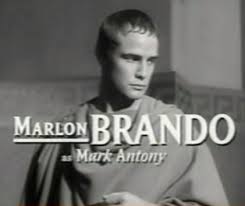

Acto I
Bruto a Casio: …look you…
…Cicero looks with such ferret and so fiery eyes
As we have seen him in the Capitol,
Being cross´d in conference by some senators…
********
César a Antonio: Would he (Cassius) were fatter!
Acto II






Porcia hiriéndose el muslo,
por Elisabetta Sirani (siglo XVII)
BRUTO: …think him (Caesar) as a serpent´s egg
Which, hatched, would as his kind grow mischievous
And kill him in the shell.
Ingmar Bergman tomó la frase para titular “The Serpent's Egg” (1977), película protagonizada por David Carradine y Liv Ullmann en el Berlín de los 20s.
***********
CALPURNIA: When beggars die, there are no comets seen.
CAESAR: Cowards die many times before their deaths;
The valiant never taste of death but once.
PORTIA
Thou hast some suit to Caesar, hast thou not?
Soothsayer
That I have, lady: if it will please Caesar
To be so good to Caesar as to hear me,
I shall beseech him to befriend himself.
PORTIA
Why, know'st thou any harm's intended towards him?
Soothsayer
None that I know will be, much that I fear may chance.
Acto III
CAESAR:
I could be well moved, if I were as you:
If I could pray to move, prayers would move me:
But I am constant as the northern star,
Of whose true-fix'd and resting quality
There is no fellow in the firmament.
The skies are painted with unnumber'd sparks,
They are all fire and every one doth shine,
But there's but one in all doth hold his place:
So in the world; 'tis furnish'd well with men,
And men are flesh and blood, and apprehensive;
Yet in the number I do know but one
That unassailable holds on his rank,
Unshaked of motion: and that I am he.
****************
CASCA: Speak, hands, for me!
Primero CASCA y luego los otros conspiradores y Bruto apuñalan a César.
CÉSAR: “Et tu, Brute? Then fall, Caesar”.
Y muere.

cry Havoc and let slip the dogs of war
Meaning
The military order Havoc! was a signal given to the English military forces in the Middle Ages to direct the soldiery (in Shakespeare's parlance 'the dogs of war') to pillage and chaos.
Origin
The Black Book of the Admiralty of 1385 is a collection of laws, in French and Latin, relating to the English Navy. In the 'Ordinances of War of Richard II' in that book we find:
"Item, qe nul soit si hardy de crier havok sur peine davoir la test coupe."
I text in English that comes nearer to defining the term is Grose's History of the English Army, circa 1525:
"Likewise be all manner of beasts, when they be brought into the field and cried havoke, then every man to take his part."
Shakespeare was well aware of the use of the meaning of havoc and he used 'cry havoc' in several of his plays. The 'cry havoc, and let slip the dogs of war' form of the phrase is from his Julius Caesar, 1601. After Caesar's murder, Anthony regrets the course he has taken and predicts that war is sure to follow.
El discurso funeral de Antonio:
Friends, Romans, countrymen, lend me your ears
I come to bury Caesar, not to praise him…
Acto IV
An itching palm
Cassius:
In such a time as this it is not meet
That every offense should bear his comment.
Brutus:
Let me tell you, Cassius, you yourself
Are much condemn'd to have an itching palm,
To sell and mart your offices for gold
To undeservers.
Cassius:
I, an itching palm!
Julius Caesar Act 4, scene 3, 7–12
"An itching palm" is one that must be scratched with coins. Brutus's dermatological metaphor implies that Cassius's desire for gold—which leads to the sale ("mart") of favors—is unconscious and compulsive. Cassius doesn't think, he just scratches.

No hay comentarios:
Publicar un comentario